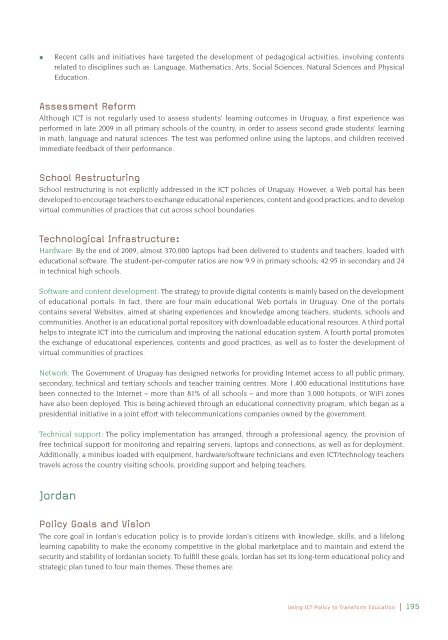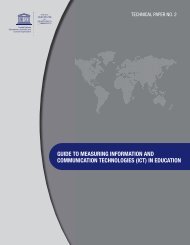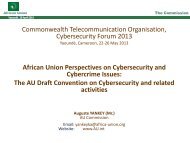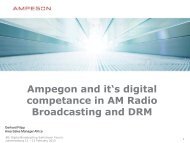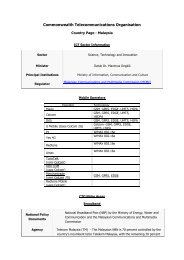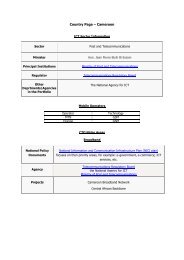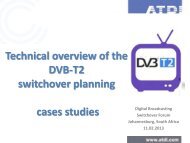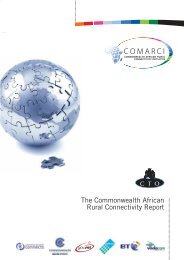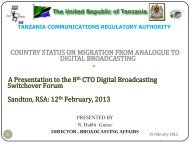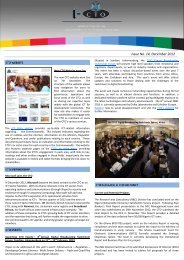Transforming education: the power of ICT policies - Commonwealth ...
Transforming education: the power of ICT policies - Commonwealth ...
Transforming education: the power of ICT policies - Commonwealth ...
Create successful ePaper yourself
Turn your PDF publications into a flip-book with our unique Google optimized e-Paper software.
apple Recent calls and initiatives have targeted <strong>the</strong> development <strong>of</strong> pedagogical activities, involving contents<br />
related to disciplines such as: Language, Ma<strong>the</strong>matics, Arts, Social Sciences, Natural Sciences and Physical<br />
Education.<br />
Assessment Reform<br />
Although <strong>ICT</strong> is not regularly used to assess students’ learning outcomes in Uruguay, a fi rst experience was<br />
performed in late 2009 in all primary schools <strong>of</strong> <strong>the</strong> country, in order to assess second grade students’ learning<br />
in math, language and natural sciences. The test was performed online using <strong>the</strong> laptops, and children received<br />
immediate feedback <strong>of</strong> <strong>the</strong>ir performance.<br />
School Restructuring<br />
School restructuring is not explicitly addressed in <strong>the</strong> <strong>ICT</strong> <strong>policies</strong> <strong>of</strong> Uruguay. However, a Web portal has been<br />
developed to encourage teachers to exchange <strong>education</strong>al experiences, content and good practices, and to develop<br />
virtual communities <strong>of</strong> practices that cut across school boundaries.<br />
Technological Infrastructure:<br />
Hardware: By <strong>the</strong> end <strong>of</strong> 2009, almost 370,000 laptops had been delivered to students and teachers, loaded with<br />
<strong>education</strong>al s<strong>of</strong>tware. The student-per-computer ratios are now 9.9 in primary schools; 42.95 in secondary and 24<br />
in technical high schools.<br />
S<strong>of</strong>tware and content development: The strategy to provide digital contents is mainly based on <strong>the</strong> development<br />
<strong>of</strong> <strong>education</strong>al portals. In fact, <strong>the</strong>re are four main <strong>education</strong>al Web portals in Uruguay. One <strong>of</strong> <strong>the</strong> portals<br />
contains several Websites, aimed at sharing experiences and knowledge among teachers, students, schools and<br />
communities. Ano<strong>the</strong>r is an <strong>education</strong>al portal repository with downloadable <strong>education</strong>al resources. A third portal<br />
helps to integrate <strong>ICT</strong> into <strong>the</strong> curriculum and improving <strong>the</strong> national <strong>education</strong> system. A fourth portal promotes<br />
<strong>the</strong> exchange <strong>of</strong> <strong>education</strong>al experiences, contents and good practices, as well as to foster <strong>the</strong> development <strong>of</strong><br />
virtual communities <strong>of</strong> practices.<br />
Network: The Government <strong>of</strong> Uruguay has designed networks for providing Internet access to all public primary,<br />
secondary, technical and tertiary schools and teacher training centres. More 1,400 <strong>education</strong>al institutions have<br />
been connected to <strong>the</strong> Internet – more than 81% <strong>of</strong> all schools – and more than 3,000 hotspots, or WiFi zones<br />
have also been deployed. This is being achieved through an <strong>education</strong>al connectivity program, which began as a<br />
presidential initiative in a joint effort with telecommunications companies owned by <strong>the</strong> government.<br />
Technical support: The policy implementation has arranged, through a pr<strong>of</strong>essional agency, <strong>the</strong> provision <strong>of</strong><br />
free technical support for monitoring and repairing servers, laptops and connections, as well as for deployment.<br />
Additionally, a minibus loaded with equipment, hardware/s<strong>of</strong>tware technicians and even <strong>ICT</strong>/technology teachers<br />
travels across <strong>the</strong> country visiting schools, providing support and helping teachers.<br />
Jordan<br />
Policy Goals and Vision<br />
The core goal in Jordan’s <strong>education</strong> policy is to provide Jordan’s citizens with knowledge, skills, and a lifelong<br />
learning capability to make <strong>the</strong> economy competitive in <strong>the</strong> global marketplace and to maintain and extend <strong>the</strong><br />
security and stability <strong>of</strong> Jordanian society. To fulfi ll <strong>the</strong>se goals, Jordan has set its long-term <strong>education</strong>al policy and<br />
strategic plan tuned to four main <strong>the</strong>mes. These <strong>the</strong>mes are:<br />
Using <strong>ICT</strong> Policy to Transform Education | 195


